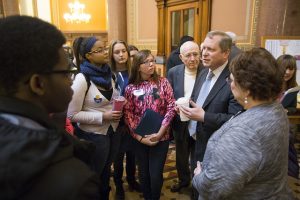DMPS Voices Urge Legislators to Support School Fund

Parents, students and supporters took part in DMPS Day at the Capitol, urging legislators to continue the sales tax that funds school building improvements and renovations.
While the daily announcements droned over the intercom Wednesday morning at East High School a passionate posse of volunteers was assembling in the auditorium. The announcements were routine stuff: cheerleading and soccer tryouts; congratulations to qualifiers for the National Honor Society; confirming correct spelling of senior names for diplomas with the registrar – that sort of thing. The sort of thing that’s taken for granted. Like funding for public schools ought to be. But the group gathering in the auditorium was there because school funding dare not be taken for granted.
Wednesday was Advocacy Day for the DMPS Community Legislative Action Team at the Iowa State Capitol and before the mix of 25 or so school board members, parents, district administrators, retired educators and current students marched over to the statehouse to buttonhole legislators they plotted strategy nearby.
The emphasis was on legislation pending in the Iowa House of Representatives aimed at delaying the sunset, or expiration, of the revenue stream for schools infrastructure known as the Statewide Penny sales tax, currently set to lapse in 2029.
A finish line that’s 13 years away might seem less than urgent but DMPS school board member Cindy Elsbernd and Chief of Operations Bill Good explained why that’s not the case. The district leverages its future revenues from the sales tax (rebranded as SAVE: Secure and Advanced Vision for Education) against the issuance of bonds so it can complete projects sooner, thereby minimizing costs.
The volunteers all received a packet of talking points and issue backgrounds so they would not go to Capitol Hill unarmed. One of its elements was a copy of the district’s five-year plan for capital improvements financed with SAVE revenues that covers 2015-2020. But, “We have identified $300 million in needs beyond our five-year plan,” Good said. “In 2018 we will develop a new facility needs assessment which I would project to be much greater than $300 million.” Not surprising in a district where the average age of school buildings is 60 years.
So the sooner school districts know they can count on SAVE dollars indefinitely, the better.
Among those reporting for a self-imposed civic duty were a contingent of East students from the Scarlet Ambassadors, a class that emphasizes leadership and service learning. This year there are two sections of the class. Next year only one will be possible due to tighter staffing allocation resulting from the legislature’s tardy and ultimately insufficient adoption of the 2016-17 school aid formula. Tuesday’s announcement of a statehouse agreement to increase general fund school aid (83% of which is eaten up by teacher and staff salaries according to Good) by only 2.25% in the pending state budget falls short of what school officials across the state agree is adequate and makes extension of SAVE even more critical.
John Cacciatore; a public affairs lobbyist from PolicyWorks who represents DMPS interests every year when the General Assembly is in session, and Phil Roeder; the DMPS Director of Communications, walked the troops through their marching orders on how to engage with legislators. And then it was off to the seat of government.
Faith Bos is a senior at East and one of the Scarlet Ambassadors. “A lot of us want to become teachers,” she said. So their interest in this issue is not likely to wane when they graduate.
Outside the House chambers on the 2nd floor rotunda they talked with legislators including Zach Nunn, a Republican from Altoona who serves on the House Ways and Means Committee that deals with tax proposals. The students came away with the impression that once the general fund school aid package that was agreed to on Monday passes, attention will turn to extending the SAVE sunset and possibly easing the restriction that those funds be used exclusively for infrastructure. Governor Branstad has proposed earmarking a portion of future SAVE money to address the issue of water quality but there are proposals under consideration in the House that would separate that from the SAVE question.
Representative Nunn asked the students from East what their priorities are for use of state funding.
Emma Stanley is an Editor for the East High Scroll, the student newspaper, and a member of the girls’ swimming team. She described how upgraded Ethernet cables and laptops in place of outdated desktop computers had made deadlines easier to meet in the Journalism classes. And LED lighting in the natatorium gave a new buoyancy to swim practice and home meets, she said.
Nothing lavish, just nuts and bolts stuff; stuff you dare not take for granted.




